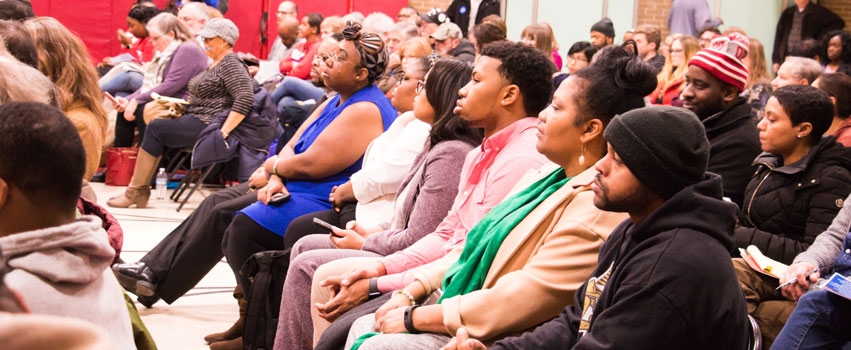Sad-Girl Ukulele Pop
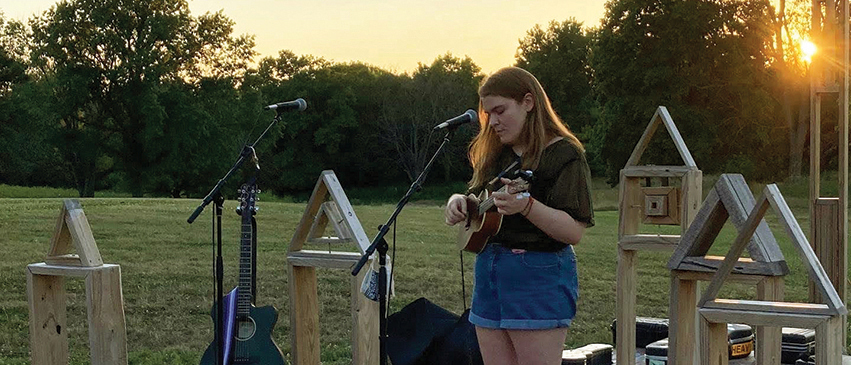
Emily Antonacci, known musically as “emily,” has rapidly made her mark on the music scene over the last year, in spite of the challenges of COVID. The Peoria-based singer-songwriter graduated from Richwoods High School in 2019 and began studying at the University of Illinois at Urbana-Champaign that fall. She began to re-examine her goals and passions when the pandemic hit, and a semester off turned into an indefinite pause as she chases her rock-star dreams—immersed in her own music while also handling marketing and management tasks for The Blank Stairs and Sarah & the Underground. With more than 350,000 plays on Spotify, emily’s “sad-girl ukulele pop” has already found an audience beyond the Peoria area. When her first EP drops later this month, it is sure to boost her profile even further.
What is your earliest musical memory?
There are home videos of me singing as a toddler, but I can’t figure out if I actually remember that happening or just know the experience from watching it back. My first real musical memory was filming a music video with my sister in our basement for a song we wrote together called “What Shall I Be?” It was about me trying to figure out what career I wanted to pursue—a very pressing matter for my seven-year-old self! According to the song, my desires at the time were to be “glamorous, rich, have a mansion [and] be famous.” We decided that being a movie star was the perfect way to achieve all four of those things, so the final line of the song was, “I know what I can be! A movie star! A movie star, yeah.” In the recording, it sounds like I was trying to emulate Britney Spears while singing that line. Instead of giving Ms. Spears a run for her money, I just sounded a bit ridiculous. My sister sang the hook, which consisted of the lyrics “ah, ah, ooh ah yee, what shall I be?” repeated a few times. I’m biased, but I think it was really catchy. I hope to record and fully produce it someday.
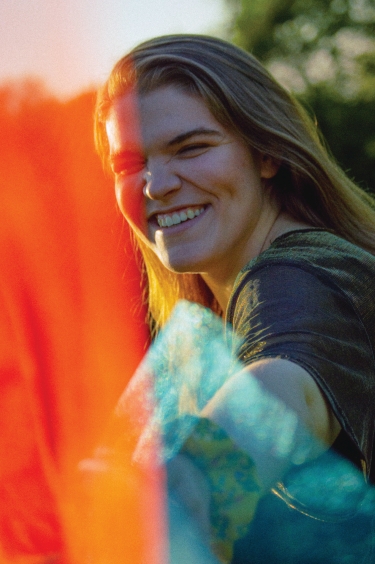
When did you first know you wanted to be a musician?
I’ve known I wanted to be a musician since I started singing as a little kid. However, I didn’t realize to what capacity I wanted to be a musician until quite recently. I’ve been convinced for most of my life that I absolutely had to have a day job and that music could only be a hobby, but this past year really changed that. Two key players in this realization were Cami Proctor of The Blank Stairs and Sarah Marie Dillard of Sarah & The Underground.
Cami and I became close friends in high school, and they introduced me to Sarah at a Red Barn open stage. After a few years seeing each other around town, I became a student of Sarah’s in July 2020. Sarah showed me all the things you can do as a musician in Peoria, and it opened my eyes to how much opportunity lives here. Around that time, Cami and I had a picnic during which I mentioned how much I admired the way Cami is pursuing music full-time. They told me it seemed like music was the career path that would truly make me happy, but something seemed to be holding me back. I was being held back by quite a bit of self-doubt and feelings of imposter syndrome, but having two successful musicians tell me they believed in me really changed the game.
Peoria truly has an incredible music scene, and I’m thrilled to be a part of it. Sarah & The Underground has a song called “The Happiest Girl,” which discusses the fact that you don’t need to move to a massive city to be a successful musician. I love that song, and its message is very accurate. Incredible opportunity lives here, and it’s not going away any time soon.
How were you introduced to the ukulele? What attracted you to it?
The first person I actively followed who played the ukulele was [English singer/songwriter] Dodie Clark. She posted her covers and original songs to her YouTube channel, and I thought she was so cool. I told my childhood best friend, Anna, how badly I wanted a ukulele, and she got me a baby-blue one for my 13th birthday. I am so thankful for her. I named it Cindy, short for Cinderella. That ukulele is the second best gift I’ve ever received—right behind the ukulele I currently play.
My main motivation was that I needed something to help me with songwriting. It was hard to write songs without an accompanying instrument, and my voice teacher at the time told me the ukulele might be a good one to start with. I still love the way it sounds, and it is a staple in my sound as a musician.
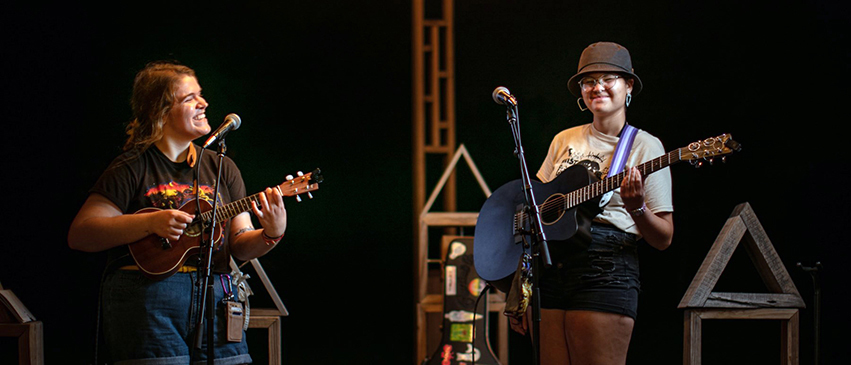
What do you believe makes your music unique?
I think my lyrics make my music unique. I try to be as honest as possible without giving too much away. Most of my songs are autobiographical, and many of the experiences I write about seem to be relatable to people across the world. In my recorded music, the arrangement of the songs makes them especially unique—that’s one of the perks of having Cami Proctor as my best friend. Cami has an incredible ability to translate emotions into sound, and I am forever grateful to have them on my team.
How do you approach the songwriting process? Who are your biggest influences?
My approach has evolved quite a bit since I started songwriting. As a little kid, I would think of a random melody, string together some lyrics, write it all down, and forget what it sounded like a few hours later. As a pre-teen, my approach was similar, but I would make voice memos of my songs on my fourth-generation iPod Touch. I feel fortunate to have recordings of those songs, and I love going back to listen to them. It’s a nice reminder of how I’ve improved. My lyrics from ages five to 13 were just regurgitations of the music I listened to at the time. Growing up in the 2000s, this included Taylor Swift and Demi Lovato vibes, and sometimes a bit of internalized misogyny.
My songwriting process now usually starts with me feeling what I call “big feelings” and not knowing what to do with them. I write down my thoughts in a journal entry or poem and start piecing together lyrics with what I’ve written. I play around with ukulele chords until I find something that fits how I’m feeling, and then I run with it. My biggest influences are definitely Dodie, Lorde, The Accidentals and Tessa Violet. I was lucky enough to get The Accidentals to play strings on my upcoming EP, and working with a group that has influenced my songwriting so much has been very surreal.
With 350,000+ plays on Spotify, you have already seen great success at a very young age. How do you promote yourself to a national audience?
I still can’t wrap my brain around the attention my music has gotten online. Most of my audience has found me through Spotify algorithmic playlists… I’ve landed on over 85,000 of those. That has been special to me because I’ve discovered many of my favorite artists from those playlists, and now my songs are listed right next to theirs. Another substantial source of streams was an artist named Thomas Sanders. He used the intro of my song “messy” in a TikTok and Instagram video, which led many of his followers to find the song on streaming services. I’ve been a fan of Thomas since middle school, so that was a huge deal to me.
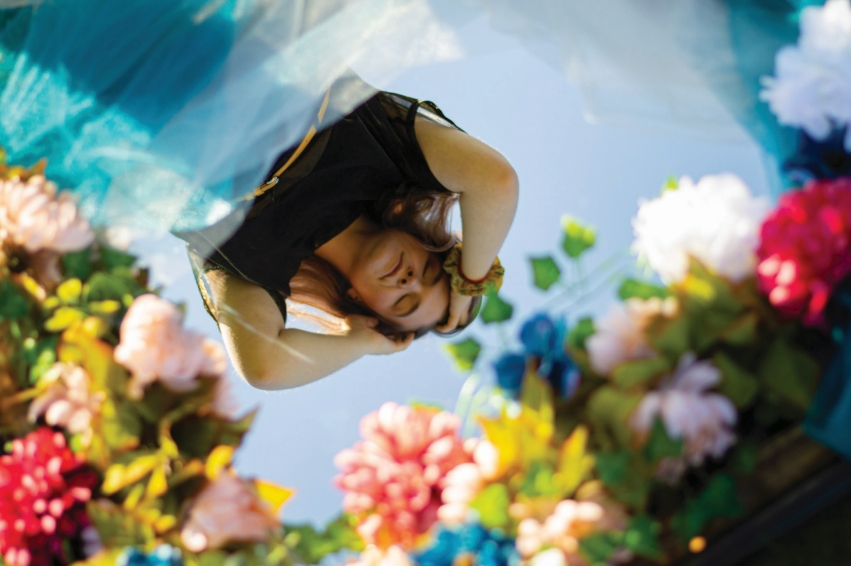
You also serve as manager of The Blank Stairs and marketing manager for Sarah & the Underground. How did you get into this side of the music business?
I am primarily a songwriter, but being a full-time musician and the process of releasing music involves more “background dancers” than non-musicians usually realize. I figured I could use my organizational skills and interest in graphic design to help other creatives who need help in those areas. I started taking photos for The Blank Stairs in 2019… and that evolved into me becoming more and more involved with the band. Last spring, Cami asked me to help redesign the band’s website and help them with their social media. Since then, I’ve started and designed their email blasts, updated their website, and collaborated with Ellie Bremenkamp to create the booklet insert for their debut album.
I told Sarah about what I was doing for The Blank Stairs at one of our lessons, and her eyes lit up. She asked if I would be interested in doing similar tasks for her band, and I’ve been their marketing manager since October 2020. Working for these bands has been a priceless learning experience, as I’ve been able to grow closer to artists who inspire me and apply what I’ve learned to my music business.
What suggestions do you have for other Peoria musicians looking to do something similar?
My most important suggestion, especially in COVID times, is to figure out a barter for these services. Playing music indoors is not safe at the moment, so gigging opportunities are more difficult to come by. Since that cashflow isn’t as strong, find a way to provide your skills in exchange for someone else’s. It is also important to keep an open dialogue about the barter’s state and stay open to the possibility of changing its terms to keep both parties satisfied. For example, my current deal with Cami Proctor and The Blank Stairs is that I provide photography, graphic/web design and managerial services in exchange for Cami’s arrangements for my songs and production work. It has been a fantastic experience so far, and our barter will likely continue beyond the pandemic. Another important suggestion is to ignore the illusion of competition that our society creates around art and music. There is enough support to go around! It is far more valuable to create a strong network of creatives to lean on, than to try to make yourself the alpha.
As an artist, how have you spent the last year of COVID?
Surprisingly, my music has been able to really thrive over the past year. The COVID era has been anxiety-inducing and full of challenges, but this forced pause on life allowed me to take a massive breath and recalibrate. Pre-pandemic, I was entirely consumed by school and everything I thought I should be doing to make my resume stronger. I was convinced that music always had to come second to something more “practical.” In the last year of COVID, I’ve grown to despise the notion that being a musician is not a viable career option. I’ve written more songs than ever before and had the privilege of collaborating with some of the artists on my favorite playlists. This year has also involved a lot of goal-setting. One of those goals was to finish recording my EP, living room, and I am very excited to announce that I met that goal a few weeks ago.
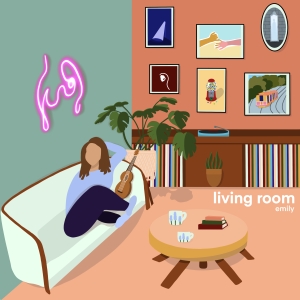
I’ve also been able to perform at some incredible venues and events both virtually and in-person, such as the March to the Polls, Cyd’s in the Park, and the Canopy Club’s weekly virtual open mics. The Canopy Club open mics are very special to me. I was always too nervous to go to their in-person open mics while I was living in Champaign-Urbana, but I’ve been able to join an amazing community through the virtual version. It has become a highlight of my week, and you can catch us live every Monday night via the Canopy Club’s Facebook page. Through the friends I made there, I was invited to play an hour of live music on 90.1 WEFT in Urbana, and that was a blast.
Tell us about your plans for 2021. What do you have in the works?
2021 is going to rock. The lead single from my EP was released on March 19, and it’s one of my favorite songs I’ve ever written. It is called “melt,” and I hope people love it as much as I do. The rest of the living room EP will be on all streaming platforms on April 23. Along with its release, I’ll be releasing merch for the first time, which makes me feel like a rock star. Ginger Batton (@gingerbaystudios on Instagram) designed the cover art for “melt” and the EP, along with a t-shirt and stickers that will be available for preorder on my website (emilyoffstage.com) when living room drops. My website and mailing list are also great places to keep track of where you can see me perform COVID-safe shows while the weather is nice. Otherwise, I plan to write and record more music this year, including my social justice song, “it’s on you,” and an EP of songs I wrote with my partner. PM
